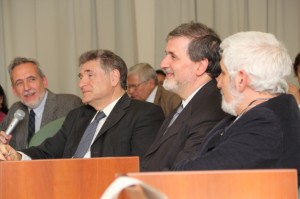On 12 September 2012, four exponents of different religions spoke about the dialogue between science and religion. The panel was moderated by Dr. Ignacio Silva, from the University of Oxford, within the framework of the seminar “Science and Religion” organized by the Philosophy Institute of Austral University.
Rabbi Abraham Skorka, rector of the Latin American Rabbinical Seminary, acknowledged that, from a young age, “he looked for God also in equations”. Skorka expressed himself as a man of faith and based on a path very close to him, since he studied Chemistry and Exact Sciences. The Rabbi quoted Nathan Aviezer, who shows parallels among facts that explain religions and science and that are irreversible: “That there was a beginning, that is so”.
Skorka explained that statements in science are proven in the laboratory, and statements of faith are of faith, and have nothing to do with the lab. “But faith not only in God, but also in values. He who is not religious does not kill because it does not seem right”, he clarified. For the times when science and religion come together, he chose the Hebrew word for “kissing”.
Likewise, he considered that when someone tries to do science, they may get out of a logical structure and reach a moment when they wonder “what this is”. “When we go in depth into science, let us never forget humility. Humility is the key to avoid arrogance”, he concluded.
Gustavo Bize, BS, Imam of the Yerrâhî Islamic Association of Buenos Aires, titled his presentation “Islam and Knowledge: outline of a Koranic epistemology and its projection over time”. Bize, a graduate in exact sciences and an academic at the National University of 3 de Febrero, explained that these encounters about science and religion and their conciliation are unthinkable in Islam. His religion, he explained, was born with a vocation toward knowledge: “The expression ‘endowed with intellect’ is present in several parts of the Koran”. The Koran, he explained, also includes calls for man to contemplate nature and its creator in it. Besides, he reminded that between the 9th and 13th centuries Arabic was the language of scientists and, among others, Roger Bacon and Maimonides studied and wrote in Arabic.
For Bize, what matters in the relationship science and religion is the inner disposition to the truth.
“Science and Religion in Protestantism, breaking avant-garde myths” was the title of the presentation by pastor Jerónimo Granados, who explained that there should be an analysis, in each branch of Protestantism, of how the debate is faced. “The history of Protestantism in itself does not present resounding scientific figures up to the Enlightenment and Romanticism”, he reminded, and presented the figure of Friedrich Schleiermacher, who tried to bring the world of scientific ideas closer to the world of Christianism. According to Granados’ explanation, Schleiermacher’s effort was great, because in the Protestant world there were still discussions about theology. But from that moment the study of biblical hermeneutics, that is, the study of the Bible “in a scientific way” began. Some, he explained, threw up their hands in horror, but the objective was that science can be at the service of theology.
Miguel de Asúa, a Catholic professor, spoke about “Evolution and Christianism. The vision of the Catholic Church”. De Asúa began quoting Pius XII and his clarification that he did not forbid the doctrine of evolutionism to be discussed among learned men, and John Paul II acknowledging that “the theory of evolution is more than an evolution”. Besides, he considered the conference on the subject organized in 2009 at the Gregorian University, together with the Pontifical Council for Culture as a milestone and a very important gesture, even though he regretted that many Catholics still deny the possibility of evolution.
There are authors, de Asúa considered, who understand evolution as the proof of the nonexistence of God, and there are creationists who would be the opposite of these. His proposal is to skip the dilemma between evolution and religion.
At the end of the meeting there was time for questions and debate.



